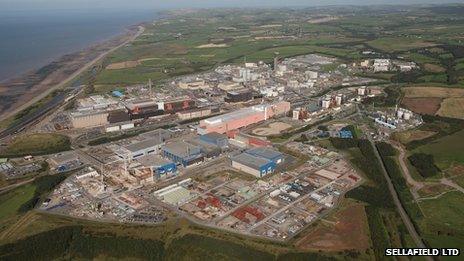Sellafield partly closed after 'above normal' radiation
- Published

A perimeter alarm detected "elevated" radioactivity
The Sellafield nuclear reprocessing plant in Cumbria is partially closed after "elevated levels of radioactivity" were detected.
Each building was checked after a perimeter alarm was triggered at the north of the site.
The company later said it was naturally occurring background radiation and not attributable to any issue or problem with any operation on site.
A spokesman stressed there was no risk to the public or workforce.
He added: "There can be no guessing on nuclear sites".
Rory O'Neill, director of stakeholder relations, said: "One of the 20-odd site perimeter monitors that we have is registering above normal levels of radiation.
"It's not a level that would trigger any kind of activity on or off site. It's below levels that would demand us to do sheltering or anything like that."
'Right decision'
In a statement, The Department of Energy and Climate Change said: "We are in constant contact with Sellafield, but we have no reason to believe that it is any more serious than they've said."
Part of the plant is being cleared to allow detailed investigations and the "relevant experts" are on site, a Sellafield spokesman said.
David Moore, chairman of the West Cumbria Cumbria Stakeholders' Group, an independent watchdog funded by the Nuclear Decommissioning Authority, said the company's actions did not imply "anything has gone wrong on the site".
"They've never been scared to raise the levels for safety," he said. "I think they've taken the right decision here."
Sellafield later said in a statement: "Our in-air monitors are extremely sensitive and pick up on any abnormality.
"Overnight the monitoring system initially indicated elevated levels of activity.
"Following investigation and analysis, we can now confirm these levels to be naturally occurring background radon.
"We would like to thank our staff and the wider West Cumbrian community for their calm and mature response to events this morning."
Day personnel, agency staff and contractors have been told to stay at home until Monday.
Other workers, including transport and utilities personnel, are working as normal "in support of plant continuity requirements".
Paddy Regan, professor of nuclear physics at the University of Surrey, said removing staff from site in such circumstances was "standard protocol" and a "sensible precaution" although rare.
The alarm would be reported to the International Atomic Energy Agency, but was not currently at a level measured by the International Nuclear Event Scale, Sellafield said.
As well as reprocessing nuclear fuel, Sellafield houses most of the country's highly radioactive waste and its whole civil plutonium stockpile.
Malcolm Grimston, an energy expert from thinktank Chatham House, said there had been a "real cultural change" at the company which meant it was "much more open and honest".
- Published17 January 2014
- Published4 October 2013
- Published23 September 2013
- Published23 September 2013
- Published8 August 2013
- Published7 November 2012